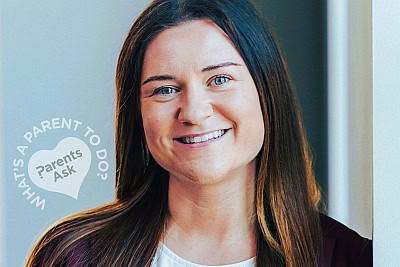If your child constantly asks you for sweets, and you never know exactly how to respond, you’re far from alone. Plenty of parents struggle with knowing how to handle the question of sugar in their children’s diet.
Maybe you wonder: Is a sugary cereal for breakfast and then ice cream as an after-school snack too much? Should you closely limit your child’s sugar intake? And, knowing that too much sugar can ultimately lead to negative health outcomes like diabetes and other health issues, how do you balance not vilifying sugar with wanting your child to be healthy?

Registered Dietitian Kalli Ventura
Registered dietitian Kalli Ventura, who works with one of the biggest school districts in America, says one of the most important things is finding balance. Sugar-sweetened foods can be a part of a healthy diet in moderation. But moderation and balance are the key.
“We don’t want to demonize and overly restrict or totally prohibit food groups unless there’s a reason—like a food allergy,” Kalli says. “This is because we know that overly restricting foods early in life can lead to overconsumption and unhealthy eating patterns later. There is space for foods with sugar, but learning how to create a healthy balance is the challenge.”
In this installment of our “What’s a Parent to do” blog series, Kalli helps us understand the different types of sugar, how to handle constant requests for sweets, and how to manage sugar as part of a healthy diet for children.
Q: Why is sugar something a parent should be concerned about anyway?
 First, know there’s a biologically-based reason kids like sugar. Babies are born preferring sweetness so they favor breast milk. In nature, sweet foods tend to be safe and calorie-rich, and bitter ones are toxic.
First, know there’s a biologically-based reason kids like sugar. Babies are born preferring sweetness so they favor breast milk. In nature, sweet foods tend to be safe and calorie-rich, and bitter ones are toxic.
It’s important to distinguish between the types of sugar.
There’s the naturally occurring sugars, fructose and lactose, in fruit and dairy products. Then, there’s added sugar.
Food manufacturers add high-fructose corn syrup, sucrose, and other sweeteners to products like beverages, breakfast cereals and bars, snacks, and many other everyday staples. That’s what parents should focus on, Kalli says. When kids fill up on these foods, there’s less space for fruits, veggies, whole grains and unsweetened low-fat dairy products.
Added sugar eaten in excess has also been linked to increased risk for heart disease and high blood pressure. A Purdue University study found the biggest sources of sugar in the average child’s diet are juices, sodas, and sports drinks.
Q: How much added sugar is OK, and how much is too much?
According to the 2020-2025 Dietary Guidelines for Americans, a healthy dietary pattern doesn’t have lots of room for extra added sugars. The guidelines tell us that added sugar should be limited to less than 10% of calories per day starting at age two.
Children younger than two years old should avoid foods and drinks with added sugar altogether.
The American Heart Association recommends that children and teens consume less than six teaspoons of added sugar a day, and drink no more than eight ounces a week of sugary drinks. For reference, one serving of a sugary breakfast cereal could contain over two teaspoons of sugar.
Q: Should I count the grams or ounces of added sugar my kids are getting every day?
 Counting grams of sugar is not realistic or sustainable, Kalli says. It could also create a culture of restriction in your home around sugar and food, which could later lead to overindulging.
Counting grams of sugar is not realistic or sustainable, Kalli says. It could also create a culture of restriction in your home around sugar and food, which could later lead to overindulging.
What you want is a healthy relationship with all foods, and that includes foods that have added sugar.
In past generations, there were often feelings of guilt associated with enjoying certain foods, including those with added sugar. That’s an approach people need to continue to move away from, says Kalli.
To provide your kids with a well-rounded diet and healthy attitudes toward food, she suggests starting at the grocery store. When you’re shopping, make sure you stock your cart with a wide array of wholesome, nutrient dense foods to support a well-rounded diet. Nutrition labels, which since 2020 have specified added sugars, can also help guide your buying decisions.
Q: How do I respond if my child constantly asks for sweets? Do I say “no?”
 Try to reframe your thinking. Perhaps you say “yes, but” instead of a firm “no” all the time.
Try to reframe your thinking. Perhaps you say “yes, but” instead of a firm “no” all the time.
It’s important to let your child guide their own food journey as much as they can. So, try to give them plenty of options and support what they’re craving.
If your child asks for a cupcake, try saying “yes,” then serve it alongside a food that may have more nutrients like a piece of fruit or some cheese.
Stock your kitchen with, and offer, more nutrient-rich alternatives.
Instead of ice cream, offer a frozen fruit pop. The reality is that sometimes a “no” is necessary, but Kalli recommends trying to frame it as a “positive no.”
That is, try: “We just had a cupcake an hour ago. Let’s talk about what your body is craving to give you long lasting energy now” or “Let’s have that cupcake after dinner when we’re all enjoying them together, and get you the food your body needs now to fuel your afternoon, like ….”
Q: What do I do if my child sneaks sweets?
Food sneaking happens when there’s guilt associated with that food; we don’t want other people to know we’re eating it.
Behind those feelings is the idea that there are goods foods and bad foods. The bad foods are ones that we shouldn’t be eating, so we sneak them.
If you find candy wrappers in your child’s bedroom, for example, open a dialogue with them about it. Let them know they don’t have to hide food from you.
If they’re hungry, tell them they can eat openly, and make sure they understand that foods with added sugar have a place as part of a diet filled with wholesome, nutrient dense foods that help them power their day.
If they’re eating very often outside of or after mealtime, you may also want to gauge whether you child is getting enough food at breakfast, lunch, and dinner. If not, perhaps you offer more food then, or healthy snacks like yogurt and berries or a piece of whole-grain bread with peanut butter between meals.
Q: What about letting my child eat foods with sugar before bed? Won’t the sugar make them hyperactive?
The idea that kids will get wild after they eat sugar is based on a single study done back in the mid-1970s. Since then, this topic has been widely studied and contradicted.
An overview of scientific research studies on the topic published in the Journal of the American Medical Association found that 23 experiments in 16 scientific papers showed no scientific evidence that sugar causes most children to become hyperactive.
While each child is different, the bottom line on this question is, don’t worry too much about it.
A cookie before bedtime probably won’t be the reason your child won’t sleep (and the milk along with it is a plus).
Q: Is there a better way to tackle the sugar question rather than a “tug of war” with kids wanting more and parents trying to get them to eat less?
 As a parent, your overall strategy or goal around sugar shouldn’t be to eliminate it entirely since it’s an important part of our food culture.
As a parent, your overall strategy or goal around sugar shouldn’t be to eliminate it entirely since it’s an important part of our food culture.
The goal is to help kids learn how to self-regulate so they don’t regularly overconsume.
It all comes down to how you talk about food and how you frame it.
Try your best to avoid using the words “good” and “bad” and “healthy” and “unhealthy” when talking about food. Shy away from making sugary foods a reward.
Instead, keep foods neutral, and when you talk about foods, mention what they do for you. For example, carrots are good for your eyes, and birthday cake reminds us of celebrating.
Gradually, children should learn to trust their own bodies as parents give appropriate access to cake, cookies, and ice cream alongside other foods.
Q: What if I’ve unintentionally already established a good-bad connotation with certain foods? Is it too late to reverse that?
No, it’s not too late. But know it will likely be a gradual process to shift your child’s thinking. It probably won’t happen overnight.
Take small steps toward change as you keep in mind that attitudes toward foods have changed over generations. Kalli says she hopes that today’s kids will have a much better relationship with food.
Q: What’s a Parent to Do? Ideas for handling kids’ sugar requests.

There’s an art to not demonizing sweets or outright denying kids sugar-sweetened foods while also ensuring they eat plenty of foods with greater nutritional benefits (and also realizing that saying “yes” isn’t always possible).
Try some of the following tips:
- Come at it with curiosity. Keep an open dialogue with your child about all foods and ask questions about their likes and dislikes. If they sneak food, ask why.
- Keep sugar in mind when shopping. Some foods that have added sugar, like dried cranberries or applesauce, will often have a version with less or no added sugar. Often, kids won’t notice the difference, so you can buy the less sugary option.
- Dilute the juice. Some parents say yes to juice, but they add just a splash of water to it. Your child gets the sweet flavor and is satisfied without getting all the sugar of 100% juice.
- Focus on food pairing. If your child wants a cookie or two for an after-school snack, serve it with a side of low-fat milk or string cheese. Give a scoop of ice cream with fruit and nuts on top or make chocolate-covered strawberries.
Tackling the sugar question isn’t easy, but it is important. Be patient. Change won’t happen overnight.
Kalli recommends not thinking about it as a battle you need to win, but rather a gradual change in dynamic towards a better balance—where foods with added sugar can be enjoyed, but in a way that doesn’t crowd out the nutrient dense foods kids need to power their days and their lives.
Kalli Ventura is a Registered Dietitian and part of Aramark’s Nutrition Network—a community of dietitians within Aramark Student Nutrition. The Nutrition Network connects and engages Aramark Student Nutrition RDNs and other nutrition experts in ways that benefit school students, parents and caregivers, and their district’s health and wellbeing initiatives.
Note: Since everyone’s health history and nutritional needs are so different, please make sure that you talk with your doctor and a registered dietitian to get advice about the diet and exercise plan that‘s right for you.

